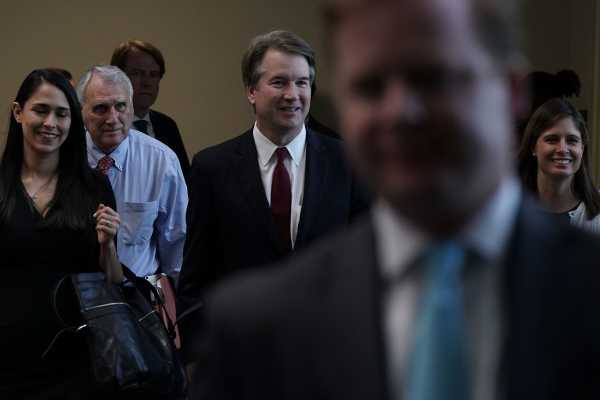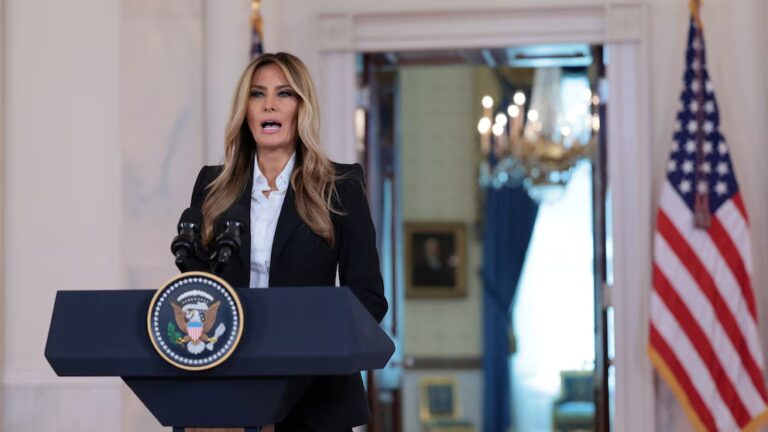
Supreme Court nominee Brett Kavanaugh’s views on presidential powers are not helping those concerned about the integrity of the Russia investigation sleep better at night. The latest development: the judge’s suggestion many years ago that the Supreme Court might have gotten it wrong when it compelled President Richard Nixon to turn over the Watergate tapes.
In the trove of documentation Kavanaugh turned in to the Senate Judiciary Committee as part of the confirmation process is a 1999 roundtable discussion where Kavanaugh floated the idea that maybe the United States’ highest court made a mistake in 1974. That’s the year it ruled unanimously in United States v. Nixon that the president had to hand over to a federal district court the tape recordings and other subpoenaed materials tied to the Watergate break-in. Mark Sherman at the Associated Press was the first to report the comments.
Kavanaugh’s belief in the importance of executive power is already under scrutiny, especially in light of special counsel Robert Mueller’s ongoing investigation and the possibility that President Donald Trump could be subpoenaed or, less likely, indicted. As Vox’s Jen Kirby points out, the Supreme Court could wind up hearing some element of the Russia investigation, and there’s a possibility Kavanaugh could be one of the justices to decide on the matter.
In a transcript of a roundtable discussion published in the January-February 1999 issue of the Washington Lawyer on attorney-client privilege, Kavanaugh suggested that the Nixon case might have been “wrongly decided.” Per the AP, he said:
At another point, he said perhaps the court should have stayed out of the dispute altogether.
It’s not necessarily an open-and-shut case that Kavanaugh disagrees with the Supreme Court’s 8-0 decision on the Nixon tapes.
Bloomberg points out that in 1998, Kavanaugh in an article called on Congress to “codify the current law of executive privilege,” including the Nixon decision. And in a 2016 law review article, he cited the Nixon case among examples of the “greatest moments in American judicial history” when judges “stood up to the other branches, were not cowed, and enforced the law.”
Still, his 1999 comments in the Washington Lawyer roundtable raised eyebrows.
Harvard law professor and constitutional scholar Laurence Tribe in a tweet called them “deeply alarming.” University of Texas Steve Vladick said it was a “big deal” and could have implications for Mueller.
This isn’t the first time Kavanaugh’s view of executive power has raised eyebrows
In the 1990s, Kavanaugh worked on independent counsel Ken Starr’s investigation of President Bill Clinton, an aggressive probe that started off with a land deal and ended with a recommendation he be impeached for lying about an affair with Monica Lewinsky.
But after serving in President George W. Bush’s administration and getting an up-close look at the presidency, Kavanaugh’s views changed — now he believes a sitting president shouldn’t be investigated at all.
In an article for the Minnesota Law Review in 2009, Kavanaugh wrote that Congress should pass a law exempting the president from criminal prosecution and investigation while in office, including from questioning by criminal prosecutors or defense lawyers.
“I believe that the President should be excused from some of the burdens of ordinary citizenship while serving in office,” Kavanaugh wrote. “We should not burden a sitting President with civil suits, criminal investigations, or criminal prosecutions.”
He warned that indicting a sitting president and putting him on trial would “cripple the federal government.” He specifically expressed regret about the Clinton probe and suggested the president perhaps could have “focused on Osama bin Laden” had he not been distracted by investigations.
Kavanaugh’s assertions have alarmed those worried about the integrity of the Mueller investigation and, more broadly, many of President Trump’s legal entanglements. Vox’s Andrew Prokop recently explained the dilemma:
With the discovery of his 1999 remarks, Kavanaugh just gave onlookers another reason to worry.
Sourse: vox.com






